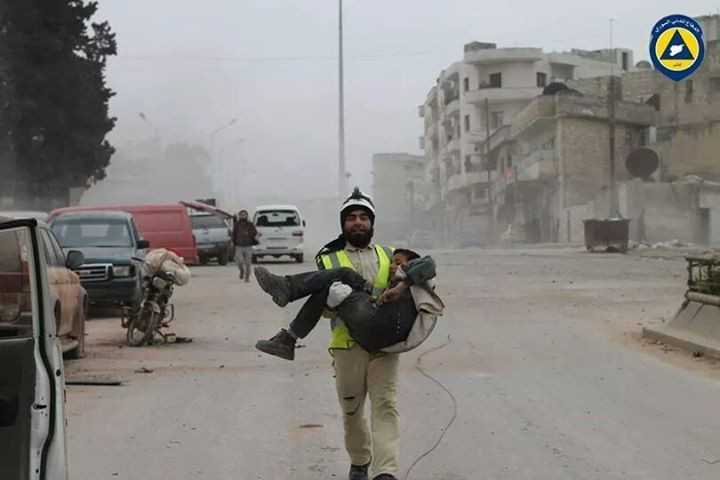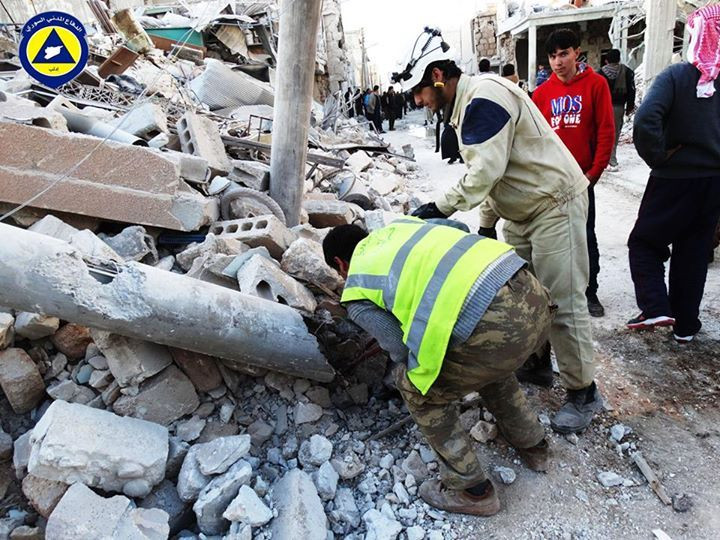Civilians In Syrian Rebel-Controlled Idlib Pay For Freedom From Assad With Barrel Bombs, Al Qaeda

When missiles fell Monday on the Idlib National Hospital, Abdal Rahman Khder reminded himself that, despite the brutal bombing by president Bashar Assad’s regime, he had been waiting four years for this day. He did the same, the activist and journalist told IBTimes, when crude barrel bombs, some loaded with chlorine gas, fell onto civilian homes hours later. And again when he saw volunteer rescue workers finding mangled bodies, covered in the grey ash from buildings reduced to rubble. That ash usually signaled death. But for Idlib, it now meant liberation, too.
Less than 24 hours before, a coalition of rebel militias had taken Idlib, Khder’s hometown, from Assad’s regime. Idlib Province, near the rebel stronghold of Aleppo in the northeast, is only the second of 14 Syrian provinces to fall to opposition forces; the first was Raqqa, now the de facto headquarters of the Islamic State group.
But Raqqa is far from the regime’s reach, while Idlib is closer to Assad’s bases. The brutal bombing it has been subjected to since being taken by the rebels may be a taste of what’s in store for other Syrian cities falling to Assad’s enemies. The regime, unable to regain control of Idlib, has been hitting the city with a massive, retaliatory barrage. Dozens of civilians have been killed and hundreds wounded, sources in Idlib said. And what happens to the people of Idlib, now governed by a group led by the local al Qaeda branch, may foretell the fate of other Syrian towns.
Roughly 30,000 civilians have fled the province in the past three days, rescue workers said. Some are Assad loyalists running for their lives. Others feared that under rebels led by al Qaeda’s offshoot in Syria, Jabhat al-Nusra or Nusra Front, the city would be run by extremists bent on enforcing a harsh version of Quranic law. But the majority were escaping their newly freed city because they knew Assad’s revenge for losing Idlib was about to rain down on them.
“I was happy [when Idlib was liberated]. I saw the city when it was occupied by the criminal Syrian regime, I was there every day,” said Abu Hassan al-Homsi, a civil activist in Idlib. But then, the bombing started, with “Bashar al Assad’s warplanes bombing with chemicals.”
The Syrian Civil Defense, a group of volunteer rescue workers, entered the city as the bombings began and started evacuating civilians. So far, they have recovered 32 bodies from the rubble.

“Civil defense teams worked three consecutive days recovering victims and the wounded from the rubble,” said a spokesman for the group, who spoke via Skype and asked to only be identified as Majd for security reasons. “All night the entire neighborhood was targeted with Scud missiles.”
Barrel bombs and artillery shells also hit the neighboring towns of Binnish and Sarmin on Monday and Tuesday, some of which contained chlorine gas, according to activists. Last week, the regime reportedly dropped barrel bombs of chlorine gas on at least two towns outside Idlib, injuring dozens of civilians, many of them children.
But barrel bombs and chlorine attacks are just a part of Idlib’s new set of worries: As rebel factions scramble to fill the power vacuum left in Assad’s wake, the city waits to see whether the new rulers will really be better than the old.
The regime was chased from the town by an alliance of four major rebel groups and the Nusra Front, which formed a joint military operation known as Jaysh al Fatah, or Army Of Conquest. On Tuesday, the coalition announced that it would appoint a civil administration of 15 members, while it continues to defend the city from Assad’s forces. Each party involved in the military offensive will be included.
While the rebels are committed to defeating the regime, Nusra Front is still a branch of al Qaeda and subscribes to the terrorist group’s long-term strategy to establish an Islamic emirate ruled by Sharia law. The victory in Idlib is a step in that direction.
“The victory in Idlib City is likely to accelerate a shift in the nature and composition of the anti-Assad revolution in 2015 that favors (al Nusra),” according to report from the Institute for the Study of War. “It occurred amidst a renegotiation of how JN [Jabhat al-Nusra] and rebel forces cooperate through which JN has increased its relative dominance within rebel ranks.”
Rebel brigades insisted that cooperation between them remains solely for military purposes, at least for now, according to Abu Yazidi, a spokesman for Ahrar al Sham, one of the more hardline Islamist brigades within Jaysh al Fatah.
“The relationship between JN and Ahrar al Sham is the same as between Ahrar al Sham and the Free Syrian Army,” he added, referring to the coalition of moderate rebel brigades who oppose the regime. “The ultimate goal is to take down Assad.”
In Idlib, JN may rule the province in coordination with the other brigades, but some early signals indicate it may impose a rule similar to that of the Islamic State group or ISIS, including crackdowns on religious minorities, strict rules for women and a ban on smoking, among other things. Since Sunday, JN fighters have kidnapped a priest and killed two Christians liquor vendor, according to the New York Times.
But according to others, those incidents are isolated events and there has been no Sharia law imposed in Idlib. Women are dressing normally, Abu Yazidi said. “There’s been nothing like the rule that ISIS enforced.”
Despite the rebel coalition’s promises of an inclusive government, residents are worried that hardliners might hijack their first chance at freedom after four years of civil war.
“We will try to stop them,” Khder said. “We want a civil state and will not allow anyone to impose its laws on us.”
Al-Homsi echoed that sentiment. “I am afraid for no one,” he said. “It’s the people’s revolution, we are one people. The Christians are our brothers.”
© Copyright IBTimes 2025. All rights reserved.






















